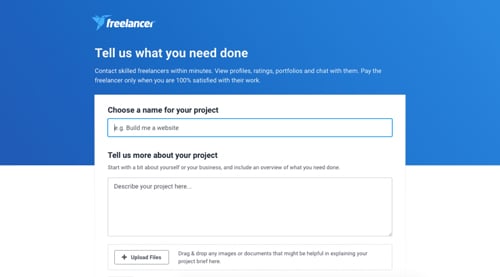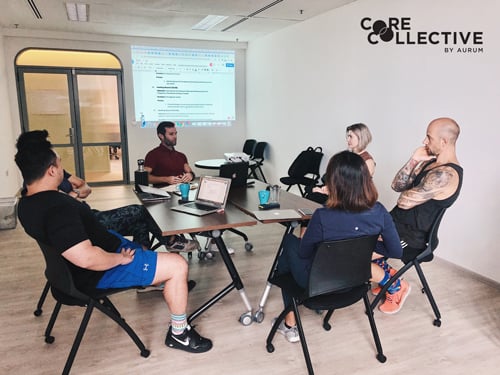What is it that differentiates the most successful personal trainers from the ones who don’t survive in the industry?They don’t have:
- Consistency in their service and client results
- Repeatable processes
- Dependency on systems not themselves
- Strong leadership
- Control
- Freedom
What they do have is…
- Hour to hour, day to day, month to month, year upon year reactive, goals
- Haphazard, hit and miss experiences and client results
- Everything is one off
- Income dependent on them working
- Little to no real leadership
- Out of control
Work on it, not just in it.
How often do you find yourself switching up clients appointments for some me time at the drop of a hat?
I’m torn as I write this because I’m not convinced personal trainers are even aware that they should be working on their businesses (usually because they mistake working with clients for working on their business), when in fact they are most often working in their business.
This is why I’m never surprised when I hear a personal trainer say they just don’t have time to work on their business. It's like who has the most clients is obviously the best and most successful trainer, which in my experience is not necessarily true.
What does success mean or look like to you?
I don’t know how long you’ve been a trainer or where you are in your career but you still have time, regardless of how you’ve rationalised it up until now. Don’t be that 35-55-year old personal trainer who works every goddamn hour just to make a living and later resents the industry because they never made time to be with their family or even get to the point where their own health becomes of less priority and declines.
I think the major challenge we fitness professionals have is prioritising health so much that nothing else really compares.
This makes your admin work pointless.
The blog you’ve been promising to write? Never materializes.
The programs you need to design for clients? You'd rather wing it instead.
Hiring your first employee? You’ll find reasons to keep putting it off.
The list goes on.
It’s one of the most common reasons clients will join gyms with no intention of hiring a personal trainer even if these good trainers have a long history of helping clients reach their goals.
Why? For the same reasons you put off working on your business, avoidance.
If clients work with you because of your proven track record, the responsibility is on them rather than you.
We’re in a culture of blame, denial and excuses. What better way than to join a gym, where you know results will not magically happen just so you can tell your friends the gym or trainers aren’t good enough?
It’s human nature. People don’t like to be judged or embarrassed. If every client is getting great results and this particular client is not, they’ll feel it’s their fault (and it may or may not be, that’s another post altogether) and do their very best to avoid this. Are you beginning to see how this makes sense?
This is also why people create a safe environment for themselves without realising it. They’ve gotten so good at protecting themselves that they’ve forgotten what anything else is like.
Trainers do this too.
In this blog, I will share how finding time isn’t the hard part. What’s hard is changing your perspective and opening your mind to what’s really happening with your time.
To kick this off, you must first figure out how you are currently using your time. This is similar to how you would begin a client’s nutrition plan. You first ask them to record a food journal so you can have a comprehensive overview of what food choices, portions, timings etc., may be interfering with their goals.
In the same vein, you should record and log each activity (instead of food) throughout the day (including those frustrating interruptions, last minute client rescheduling, cancellations) and the duration for each.
We recommend a tool like this in our business development academy for fitness professionals at Core Collective: Toggl.
Or you could use this:

Work on it, not just in it, is just one of the 7 core components we teach in our Personal Trainers Masterclass.
After one week of consistent tracking, you’ll see trends and patterns emerging. How many free annoying hours/minutes do you have between client sessions? How many back-to-back client sessions do you do? How many days per week do you add bookings where you only have to go to the gym for one client session and then end up having to wait for the next client for 6-7 hours?
How often do you work out and when? How many hours do work on a Sunday? When did you last have a date night with your partner? What about continuous studying and learning?
How often do you get interrupted, distracted or put things off?
Having this information is like receiving your client’s food journal for the first time. You can now begin to assess your time; how to be more deliberate about how best to utilise your time.
Work on your business during business hours
As you will find, asking clients to book in their sessions 4, 8 or even 12 weeks in advance allows you and them create routine, structure and consistency, the three main ingredients that most likely attracted us to working out and loving the gym.
We use this same technique for when we organise time to work on our business. The common hurdle here is trainers assume what I mean by working on your business must be something you do in addition to the entire client work you do. This misconception can weaken you before you even get started.
This is not something you have to do on the weekend or when you arrive home after your 9 pm client. That would mean more of your life taken up by business, which is what Core Collective is trying to free you from.

Core Collective is different from the other gyms I have worked in. Here, I can be the businesswoman I want to be and am very confident that Core Collective will support my business.
I am attracted to Core Collective's business model and ethos. The company helps me to thrive as a Personal Trainer and supports me in pursuing my own business goals. As a result, I am able to be a positive influence on those around me and found a space where I can do all of that and more!
If you are a Personal Trainer who is unsure of joining Core Collective, I'll start by encouraging you to make your life the best life possible. I am a person who instinctively knows that if something is right for me, I will just dive in and do that. You can sit and go, "well, what if this happens and what if that happens?" and come up with umpteen scenarios. Do that until you're blue in the face and you will not get started.
Rather, if you recognise that there'll always be a level of discomfort and is willing to grab the bull by the horns and go for it, you'll have no other option but to succeed!
The Core Collective team will be right by your side as you do. I look forward to meeting you!
- Laura Rogers (above), Personal Trainer, Genetics Coach and Certified Sports Nutritionist at Core Collective
This won’t be true for everyone and it certainly won’t be perfect right off the bat.
First, I would recommend scheduling your time. When will you work out? What days of the week will you put aside for fun stuff, dating, and being adventurous?
Next, when do you plan to take vacations? What hobbies will you pursue that may need a day or so to plan, travel and experience?
What I suggest you do next is get into the habit of putting time aside for administrative tasks. This will become time for marketing, blog writing, video content, learning sales, influence, persuasion, developing systems, business forecasting, investing, generating leads, etc.
I don’t want you overwhelmed at this point so just put it in your diary as admin because there is in fact ways to systemise all of that to become a habit.
Finally, choose your preferred work hours. If you had a choice of days and times to work with your clients, what would they be? You don’t have to model existing methods.
Now, I only want you to schedule your clients in for these times.
What?! Are you serious, Joe?!
Well, let me offer this perspective for you: has your hairdresser ever arranged an appointment around your schedule? What about your last doctors/dentist appointment? Didn't you work around their time? So, why can’t we be more professional like these?
These few exercises, alongside a few others will help you develop your coaching business model - it can help decide what to charge, whether or not to do one-on-one training, semi-private, a small group or if you need to create partnerships and collaborations.
Just like when Lawrence was free to make a weekend trip to Bintan as Mark Tan, who now is a coach under Lawrence at Core Collective (yes, we help make this happen) was looking after the day to day running of the business, Lawrence was looking at how to venture out in retreats, potentially adding more income to his bottom line.
Matej, who used to train his clients at Core Collective, has even gone one step further. He’s already held a few retreats, here he is promoting his next one in Bali, March. Nat, looks after his clients whilst he’s away (and he still gets paid from it).
It’s probably a good time now to bring up a strategy I learnt from working with 100s of trainers: we must somehow find a way to embrace this side of our business as working on your business doesn’t come naturally to you.
The truth is, you probably think that what I’m asking of you; to sit down, create strategies around marketing, operations and processes for your business are not as rewarding as seeing a client smash a personal goal or see a client get into a smaller-sized dress in time for her wedding. This makes you feel productive, I know.
These are more exciting than checking things off your to-do list and this type of strategic work can sometimes be frustrating, but it helps you see the results of your efforts.
I get you. There were so many times that I felt like this. An occasion that comes to mind was when I took on the responsibility to email a list of prospects daily.
Open rates grew, surely but slowly. It took me a lot of learning to realise it was all in the subject line!
Once opened, how do I do keep them engaged?
How do I say things in a way that they haven’t possibly already read or can’t access over the internet?
These were real life frustrations for me.
Okay, I got a list of subscribers to open the email and engage but none were taking any action. They were just reading when I really wanted them to say ‘Joe, please sign me up’.
Long story short, I got my first client after 43 daily emails. Some days, I sent two out but it was worth it. I finally broke through. The lifetime value of this client was close to £27,000 ($54,000) around the same value as my car below. This was excluding supplement sales and referrals (she referred her husband, son and sister-in-law to me - do the math).

Now, do you think it was worth it? Of course.
This is how I want you to shift your mind-set when it comes to business strategy. What is it worth to you? Money always drives me as it is closely tied to what I value most, providing the very best of things for my future wife and family. When you come to think about it, the emails took less than 20 minutes a day to send. You could probably tell me that you waste that amount of time scrolling pointlessly through Facebook or Instagram several times a day.
Catch yourself the next time you’re doing this, then choose what you will continue to do thereafter.
The second occasion was a series of failures, refinement and persevering when I didn’t want to.
First it was convincing clients to sign up for the yearly program, then asking them to pay me upfront for the year and then funding ways to maximise my referrals for every successful consultation. This list goes on but it’s always worth it.
Stop right now and give this some thought. How can you think differently about embracing this type of work? Which of your values does this align with? How can it affect your vision?
To create systems in your life, what can you outsource?
Upwork is a great tool for hiring freelance workers who can write that blog for you or be your 24/7 client support. I’ve recently heard freelancer.sg is good and reliable too.
You can also hire on Freelancer.sg. For the most part, both Upwork and Freelancer.sg are very reliable and produce quick results.
Go to freelancer.sg.

Then complete the necessary fields

The beauty of hiring someone to do the more tedious admin and business tasks is that you free up time to only do the stuff you love to do. As you love training clients, but hate writing a blog, there is someone else who hates training but loves writing.
The fitness professionals of Core Collective actually benefit from many services we designed for them. Our aim is to help our personal trainers’ businesses grow to provide as much freedom as possible. If this interests you and you’d like to learn more, get in touch with us here.

This has been burning up inside of me for a while now and I literally can’t type as fast I think but hopefully, I’ve done justice to the topic. I’d love your feedback. You can send me an email by clicking here. I also read all my personal emails except the ones I boomerang out 😉
To end, I know that not everyone likes being told what to do or being confined into some kind of box. I understand this and it’s why I love to study routines; how the best of the best perform, whether that's in business, art or sports. This is an area of your life where you get to experiment, refine, trial whatever works best for you because what works for you won’t necessarily work for someone else. So please take what I’ve shared, don’t disregard, accept and ruminate on it over the coming week as you go about your normal day-to-day business and see what pops up.
In the next post, we’ll get to how morning routines actually begin at 2 pm a day earlier, how to optimise your sleep and recovery, even training strategies, how when it is time for you to focus on the strategy side of your business, you are most productive and working on only the necessary things that bring the biggest ROI. Stay tuned.
Look out for the next blog for all of these! How do you stay productive?







